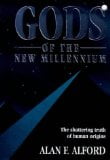 Gods of the New Millennium
Gods of the New Millennium
by Alan F Alford
Hodder & Stoughton, £8.99, ISBN 0340696133
The plot of the story is simple. Ancient civilisations report their gods were flesh and blood, who created humans in their own image. Alford is prepared to explain gods as ancient astronauts, and humans as a genetic engineering modification of Homo erectus. This is not exactly a new idea. A considerable literature on this pseudo-history exists, and Alford quotes liberally from von Däniken, Hapgood, Sitchin and others.
To pull ancient literature together a scholar ought to be able to read Sumerian cuneiform, Egyptian hieroglyphs, biblical Hebrew, classical Greek, Maya pictographs, and Inca quipu. Alford gives no evidence of having mastered any of these, but relies on translations. It is bizarre to interpret gods, where the translators who can actually read the originals see mythology.
The author posits a world wide highly technological civilisation starting with the arrival of the gods in 270,183 BC (p. 595), that is. not during the last ice age, but three glacial advances back. The age of the gods lasted until around 200 BC. Alford’s time line (pp. 595-598; 662) includes star wars of the gods with map (Fig. 11), rebellion of lesser gods, nuclear explosions, Noah’s flood and just about every event mentioned in ancient history and archaeology. Yet, this activity has left no more than some heavy stone buildings, the pyramids, Stonehenge, Tiahuanacu, and of course the Nazca lines. Why can’t we find technologically unambiguous remains of this history?
To add weirdness to delusion, Alford added a foreword to this reprint of the 1996 edition, which informs us he no longer quite believes what he wrote. His thinking has taken a “dramatic U-turn” (p. xi). He now believes “a deeper level of meaning” is hidden behind the mystery of the ancient gods. He doesn’t inform us what that might be, and I’m unwilling to ask.



